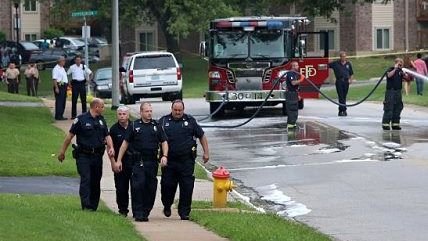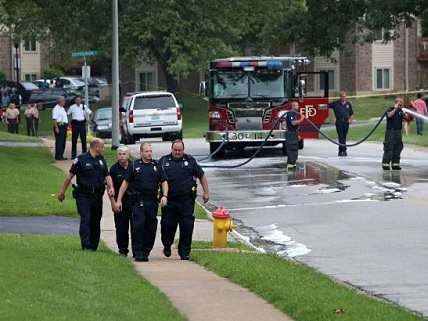Police Unions Produce Rules That Protect Bad Actors, That's How Public Unions Work


One of the important points to keep in mind as the protests over the killing of unarmed 18-year-old Michael Brown in Ferguson, Missouri, over the weekend, is that many of the privileges now afforded the unnamed officer who shot him (such as the very fact that his identity remains undisclosed) come from the contracts police unions are able to negotiate with local governments. The officer likely wasn't required to make a statement for 24 to 72 hours after the shooting. Such a courtesy is extended in many police contracts. The argument goes that cops are not flight risks and would provide more accurate testimony outside of the "fog of war" of the moment. Almost every union-negotiated police contract in the United States includes rules preventing police chiefs and mayors from summarily dismissing problem cops. Instead, these "public servants" are offered an administrative "due process" pretty much unheard of in the private sector. Appearance of impropriety alone becomes insufficient cause for termination.
This is the way cop, and all unions, work. The union negotiates on behalf of employees, seeking higher pay, better work conditions, and more job protections. In the private sector, on the other side of the negotiating table is the employer, who is seeking, generally speaking, lower costs and higher profits. Both sides need each other in a specific sense: employers need capable employees to keep their businesses running, employees need profitable employers so that they can continue to have jobs. Absent government intervention, these two sides almost always reach a mutually agreeable conclusion. A decent contract benefits the employees and the employers.
That relationship is fundamentally different in the case of public sector unions. As is its role, the public union negotiates for higher pay, better work conditions, and more job protections. But on the other side, the "employer" (theoretically local residents/taxpayers) is represented by the local government. The local government may be interested in a modicum of fiscal restraint because it has a budget to more or less balance. But local government officials have other interests, like securing the support of politically powerful public unions to raise money and win elections. Public unions and government officials, then, don't have the kind of adversarial but mutually-beneficial relationship that makes private union negotiations work. Instead, they are incentivized to cooperate to each other's benefit, at the expense of taxpayers, who foot the bill for the contract goodies and later from any wrongdoing the contract demands is defended.
And so police chiefs and political leaders, like those in Ferguson, are powerless to fire cops who through their actions wreck community relations and compromise the perceived integrity of the police force. Whether Ferguson's police chief or mayor are actually interested in firing this cop is hardly known. But in the current situation, their hands are tied by an intricate system of legal protections built for cops around the country. Firing Michael Brown's killer would not make him guilty of murder. That's what jury trials are for in this free country. But cops, who are authorized by the government to use violence to attain their goals, ought to be held to a higher standard than everyday criminals, not lower ones. A job is a privilege, not a right. Much of the left has been pushing the opposite idea, especially about public sector jobs. The corruption and abuse of power that's cultivated ought to come as no surprise.


Show Comments (44)